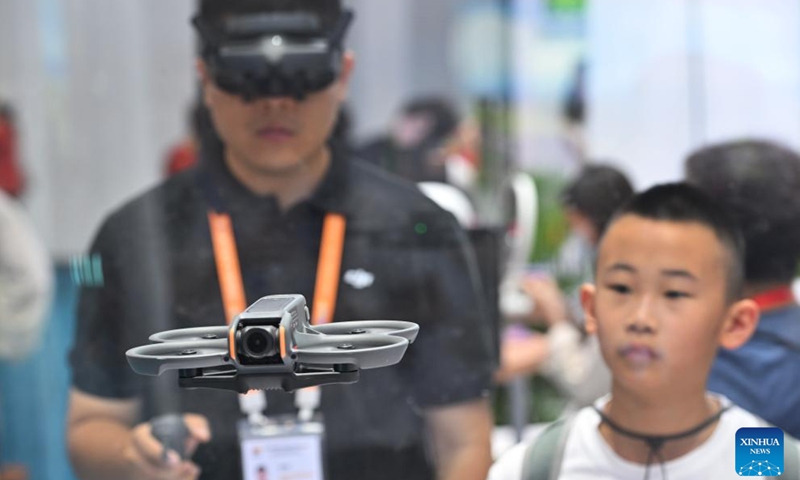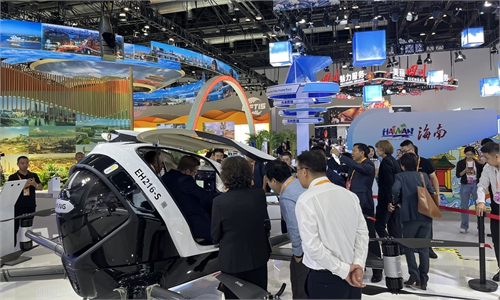US customs holds DJI's drones, citing unfounded assertion: company
Experts criticize Washington for adopting discriminatory act to crack down on Chinese firm

A staff member operates a drone at the booth of Chinese drone maker DJI at the fourth China International Consumer Products Expo (CICPE) in Haikou, capital city of south China's Hainan Province, April 15, 2024. Lasting from April 13 to 18, the expo themed "Share Open Opportunities, Co-create a Better Life" hosts over 4,000 brands from 71 countries and regions, showcasing their novel and upmarket products for global consumers.(Photo: Xinhua)
The US government is restricting Chinese dronemaker DJI from exporting select drones to the US in what appears to be part of "a broader initiative by the Department of Homeland Security to scrutinize the origins of products, particularly in the case of Chinese-made drones," DJI told the Global Times on Thursday.
The US Customs and Border Protection (CBP) has cited the Uyghur Forced Labor Prevention Act (UFLPA) as the reason for the move, the company said. "This assertion made against DJI, however, is entirely unfounded and categorically false. There is no reason for CBP to be detaining DJI's drones," it stressed.
DJI said it is not a listed entity under the UFLPA, stressing that all of the company's manufacturing is based in Shenzhen, South China's Guangdong Province, or Malaysia.
Lü Xiang, a research fellow at the Chinese Academy of Social Sciences, criticized the US for adopting the ridiculous and discriminatory UFLPA to crack down on the dronemaker.
"By doing so, the Biden government may aim to protect the US dronemaking industry. However, the unreasonable move by the US could spark further concerns worldwide over future China-US relations," Lü told the Global Times on Thursday.
As the world's leading dronemaker, DJI accounts for over half of all drone sales in the US, according to media reports.
In addition to drones, the US has been intensifying its crackdown on China in the high-tech sector, including telecommunications and electric vehicles.
Bloomberg reported on Thursday that key US lawmakers are pressing the Biden administration to block Huawei's suppliers from buying American chipmaking gear.
Commenting on a related report on US lawmakers' efforts to impose tougher chip export restrictions on Huawei suppliers, Chinese Foreign Ministry spokesperson Mao Ning on Thursday said that China opposes the US policy of overstretching of the national security concept, purposely setting hurdles and harming normal China-US economic and trade cooperation.
"We hope the US can immediately connect its wrongdoings and provide a fair and non-discriminatory environment for Chinese firms," the spokesperson said at a regular press briefing.
"The US should show sincerity and meet China halfway so as to stabilize China-US relations and facilitate the return of bilateral relations to the track of healthy, stable and sustainable development," Huo Jianguo, a vice chairman of the China Society for World Trade Organization Studies in Beijing, told the Global Times on Thursday.
During a telephone conversation between China's Commerce Minister Wang Wentao and US Commerce Secretary Gina Raimondo on October 8, Wang said, "China urges the US side to pay attention to the specific concerns of Chinese enterprises, promptly lift sanctions on Chinese companies and improve the business environment for Chinese companies in the US," according to a statement published on the website of China's Ministry of Commerce.



